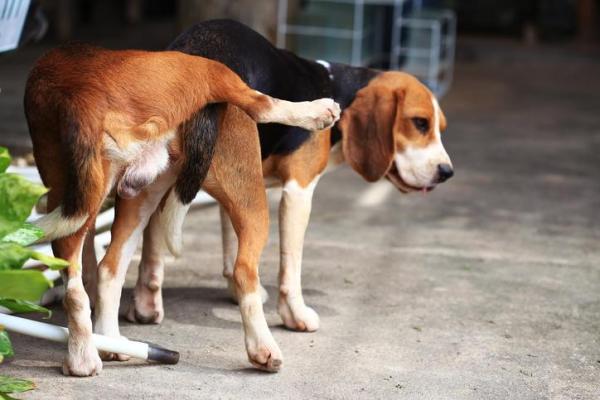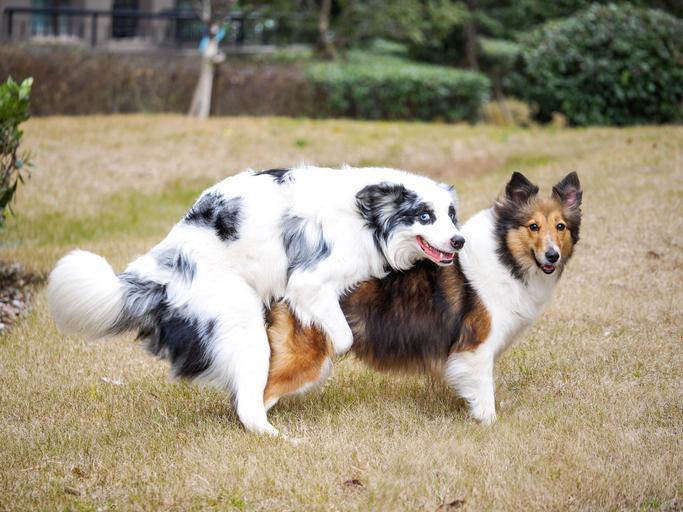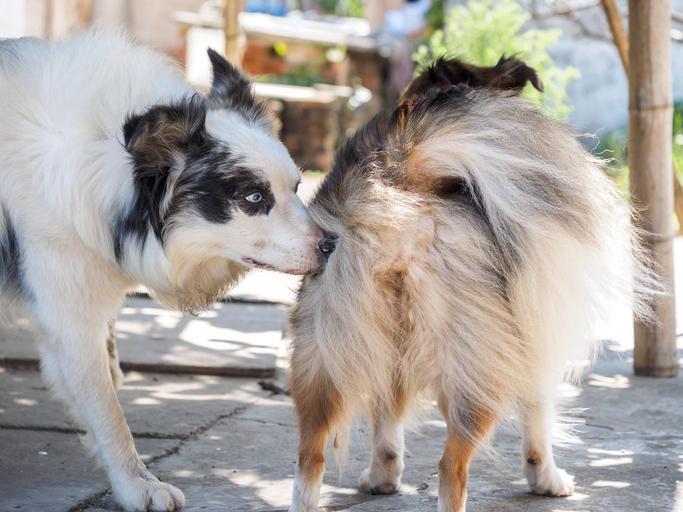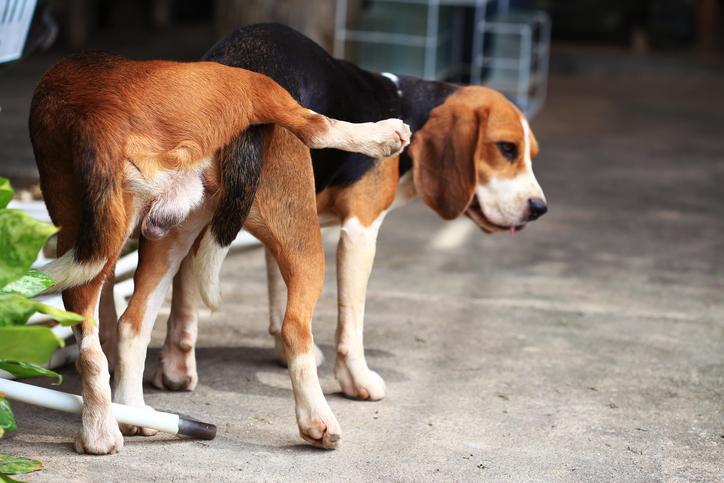How Old Do Male Dogs Have to Be to Breed?



See files for Dogs
Canine reproduction is complex and there are numerous different factors when breeding is considered. All dog caregivers should have knowledge about their dog’s reproductive cycle, sexual maturity and more, especially in the case of avoiding unwanted litters. With male dogs, it is our responsibility as their owner to know when a male dog is fertile. This will prevent both mounting and escape, which ensure your dog is cared for correctly. Not only does male dog fertility bring the possibility or reproduction, but a fertile male dog may change their general behavior.
If you’re wondering how old male dogs have to be to breed, this AnimalWised article provides the answers. Keep reading to discover everything you need to know about responsible dog breeding and male dog fertility.
When can male dogs breed?
Some guardians may ask, when do male dogs experience heat? However, this is a misunderstand of canine fertility. In female dogs, the heat cycle is their reproductive cycle necessary to gestate fetuses to be puppies. Heat manifests itself with clear and obvious symptoms, such as vaginal spotting or an enlarged vulva. In unneutered males, their desire for copulation is a response to the female being in heat. It is activated when they smell the pheromones of a bitch in heat.
Once male dogs reach sexual maturity, they will become frustrated if they cannot mate. When this happens, you may notice behavioral changes stemming from desperation for copulation. Sexually frustrated unneutered male dogs will whine, bark, try to escape, fight with other male dogs, be destructive or mark inappropriately. This behavior which varies depending on external factors, can occur at any time once a male dog has reached sexual maturity.
There are no pills or medication that can relieve the frustration of an unneutered male dog. In order to avoid this anxiety, prevent behavioral problems and control canine overpopulation, we recommend castration for male dogs. Neutering is incredibly beneficial to a dog’s health. Always make sure to consult your veterinarian about your options and the best time for neutering.
For more, we recommend reading our article where we discuss what is the difference between castrating and sterilizing a dog?
Male dog fertility age
Heat in dogs can only begin once a dog reaches sexual maturity. Before this time, you may notice puppies or young dogs mounting their siblings or objects in their environment. It is important to know that these behaviors at an early age are separate from sexual stimulation. Rather, they are related to curiosity and a part of their learning and development.
So, when does a puppy reach sexual maturity? One of the most obvious signs is when your male dog begins lifting its leg and urinating. This action is also referred to as marking. It is a way in which dogs communicate with other dogs, especially in regards to sexual maturity.
Dog sexual maturity is linked to sperm production and occurs at varied times depending on the breed of the dog. On average, a male dog becomes fertile after 6 and 12 months of age. Smaller dog breeds tend to mature faster than larger dog breeds.
Dogs reach sexual maturity before becoming fully developed. That is why the fertility age of a male dog can be delayed for up to 12 or even 24 months. A male dog is fertile from the beginning of sperm production. This is why the right precautions need to be taken even if they are not fully grown.

How old does a male dog have to be to get a female pregnant?
Once a dog reaches sexual maturity and is able to produce sperm, they can get a female dog pregnant. If the copulation is successful, then the eggs will be fertilized and the puppies will gestate. This is one reason why neutering should be carried out as soon as it is safe to do so.
You may also wonder when a dog stops being fertile. Unless a dog is suffering from an illness or is castrated, male dogs are fertile for their whole lives. They may have lower sperm production and motility, but they can impregnate a female in the right circumstances. Their sexual drive does decrease as they get older, so senior dogs may not show as much interest in copulating as younger dogs.
For more, we recommend reading our article where we discuss how to tell whether a male dog is in heat.
At what age can a male dog breed?
Now that we know at what age male dogs are fertile, we must understand that for them this is strictly reproductive. This means that male dogs are only interested in copulating when they detect the presence of a female dog in heat. For the same reason, a female dog will only allow mounting when she is in heat. Only when they are fertile can fertilization occur.
If your dog is in heat, they won't always want to mate with a male. Read our article on why my female dog won’t accept a male for more information.
How often can a male dog breed?
There is no minimum or maximum number of times a male dog can copulate with a female. It will vary depending on each individual dog. An unneutered male dog that lives with an unsterilized female dog in heat can mount her several times a day.
It is important to note that canine mating presents certain differences with respect to that of other species. In order for fertilization to occur, dogs must remain stuck for a few minutes, a situation that usually makes the female uncomfortable. Sterilizing your female dog, even if you live with a sterile male dog, is equally important.
Once a male dog has reached sexual maturity, it can be very difficult to stop them trying to mate. For advice on this circumstance, you can read how to control a male dog around a female dog in heat.
Reasons why a male dog cannot breed
Some dogs may suffer from diseases that cause sterility or anatomical malformations that prevent mounting and/or successful copulation. To know for sure whether or not a male dog is fertile, you can consult your veterinarian about a fertility test.
Additionally, hormonal abnormalities, underdeveloped or retained testicles, genital tract infections such as brucellosis, hypothyroidism or fever can all cause infertility in male dogs. Some dog tumors can also cause impotence. It is important to remember that dog breeding should not be carried illegally in homes and/or establishments.
For more, we recommend reading our article where we discuss everything you need to know about transmissible venereal tumors in dogs.
Should I breed my male dog?
We love our dogs and many of us would love to see what type of puppies they might sire. However, domestic breeding is something we discourage. There are many reasons for this, but one of the most important is animal neglect. There are many more puppies than homes which are able to house them. This leads to an overpopulation of puppies which is hard to control.
Unscrupulous puppy farms also exist. They have inhumane breeding and housing practices, something which will be exacerbated if we breed our companion dogs. By not neutering our dogs, we help put more strain on the resources required to help dogs from puppy farms.
Even if we find people who are able to adopt the puppies after we breed a dog, we cannot guarantee their suitability as dog guardians. Animal shelters and reputable breeders are better able to vet potential guardians according to the individual needs of each dog.
In general, preventing the breeding of our dogs helps them as an individual, as well as the larger dog population as a whole. We can prevent the future abandonment of dogs and help those which are in need.

Benefits of neutering a dog
As we have stated throughout this article, controlling our canine population prevents the increase of stray and homeless dogs. In order to avoid the abandonment of animals, spaying and neutering both male and female dogs is incredibly important.
Not only do these surgical interventions help decrease this abandonment rate, but they also prevent certain health problems in dogs related to their reproductive systems. Neutering or spaying dogs helps to prevent the appearance of breast or testicular cancer, psychological pregnancies, etc. Neutered dogs are more likely to live longer. In adult dogs, neutering also decreases the risk of behavioral changes by 40%.
In general, castration is preferable to other types of sterilization. This will depend your dog and your veterinarian’s recommendation, but it is permanent and helps to prevent complications.

If you want to read similar articles to How Old Do Male Dogs Have to Be to Breed?, we recommend you visit our Heat category.







